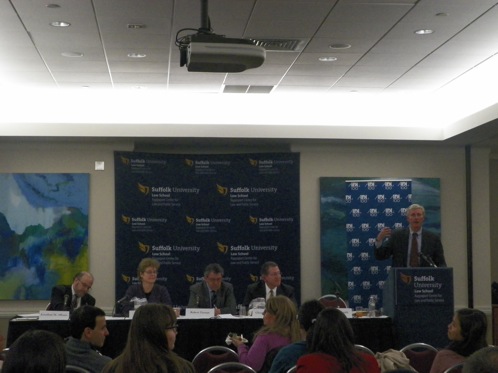Suffolk University Law School partnered with the Anti-Defamation League New England Monday to bring a presentation on discussing hate crimes on the Internet and the current regulations that apply to them.
The ADL is “the world’s leading organization fighting anti-Semitism and all forms of bigotry through information, education, legislation, and advocacy programs that counteract hatred, prejudice, and bigotry,” as described by Suffolk Law Professor Robert H. Smith.
The panelists were composed of professionals who specialize in privacy, cyber bullying, and other legal issues found on the web.
“Challenges posed by hate speech in the online age are new and uniquely complex,” Smith quoted from “Viral Hate,” a book by author Christopher Wolf, who sat on the panel, and Abraham H. Foxman. He explained that hate speech on the internet is so vaguely defined and left to the jurisdiction of users that it is difficult to narrow down on what is criminal activity and what is protected by the First Amendment.
“In the pre-internet era, the job wasn’t easy, but it certainly was easier,” Wolf said. “The issue of haters and hate speech was illustrated by people meeting down in dark alleys and distributing their materials in plain, brown wrappers. It was a problem that wasn’t completely manageable, but at least contained.”

(Photo by Dani Marrero)
The web has provided an easier medium for hate organizations or individuals to spread their ideas at a faster and more viral rate to “pollute social media,” making it an impossible task to control every post, tweet, or page being published.
Jonathan M. Albano, managing partner of Bingham McCutchen LLP, discussed what role the law should take on fighting online hate speech.
“You can try to stop speech as it’s happening, or even before it happens, and if you can’t do that, you might consider civil action you can bring to recover for the damages that hate speech can cause,” he said.
Albano said challenges this would bring include clashing with the protection the First Amendment provides over free speech, which gives the right for all speech to take place but can be addressed or subject to lawsuits later. One’s claim against online hate speech can also be dismissed due to the anonymity and vagueness of cyber bullying, since libel requires such statements to have been clearly made about a specific individual.
New England Regional Office Director of the ADL, Robert Trestan, reminded the audience that this applied to all social networks, including Facebook, Twitter, Tumblr, and Google+.
“The owners and operators of these platforms are not liable for any of these posts,” Trestan said. “It’s something you will also see in the terms of services.”
Although there is support for all online speech to be regulated, Trestan explains that the ADL does not support that approach.
“Shutting down and censoring speech is not the answer. We believe that encouraging more speech, more counter speech, is a much more effective way to face the problem.”
One of the solutions to this issue, provided by Wolf, is to begin educating children about what they will face online as well as teach them to keep their posts away from being considered hate speech.
“We should inform them that what they post online can affect their education and job opportunities,” Wolf commented. “What you say or post online can really haunt you forever.”
This year marks the 100th anniversary of the ADL, marking a century of fighting bigotry in the U.S. For more information regarding ADL and its services, visit newengland.adl.org or check them out on Twitter @ADL_NewEngland.













